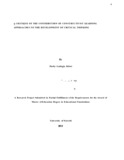| dc.contributor.author | Kibui, Purity G | |
| dc.date.accessioned | 2013-02-20T12:23:55Z | |
| dc.date.issued | 2012 | |
| dc.identifier.uri | http://erepository.uonbi.ac.ke:8080/xmlui/handle/123456789/10472 | |
| dc.description.abstract | The acquisition of critical thinking skills by the learners is important if learners are going to face
challenges posed by the many changes taking place in the society. Many instructional approaches
have been employed in an attempt to ensure that learners acquire the essential critical thinking
skills. Traditional learning approaches which are teacher-dominated emphasize on the
acquisition of a set of skills which can be transferred from the teacher to the learner. Progressive
approaches to learning emphasize on learner –centeredness where learners are involved in
constructing knowledge; a process that eventually leads to development of critical thinking. A
striking characteristic of constructivist learning is learner autonomy whereby learners are
believed to be constructors of knowledge as opposed to recipients.
It is often assumed that learner autonomy can lead to development of critical thinking by
learners. However, research findings indicated that this is not necessarily the case and that the
use of constructivism by teachers does not necessarily lead to improvement of critical thinking.
This research sought to explain this paradox by investigating the relationship between
constructivist pedagogical approaches and the development of critical thinking. This research
also sought the find out the role of the teacher in constructivist learning and to investigate the
pedagogical approaches and classroom practices that make the development of critical thinking
fail.
Two philosophical methods of inquiry were employed in this study i.e. the critical method and
philosophical analysis. The critical method was used to launch a critique on various classrooms
practices associated with constructivism in order find out whether they lead to critical thinking,
as it is often assumed. The analytic method was used to arrive at a better understanding of
educational terms associated with constructivism and critical thinking. The study found that
constructivist teachers must deliberately organize their teaching in such a way that it leads to
critical thinking. Learner autonomy perse cannot lead to critical thinking unless the teacher
ensures that the learning process has activities and content that will help in the development of
critical thinking. The role of the constructivist teacher was emphasized on in the organization of
tasks and assignments who should ensure that in the process of performing these tasks, the
learners acquire critical thinking skills.The study recommended that if teachers were to effectively use constructivist learning approaches certain measures need to be put in place: teachers need to be trained during preservice
on the use of constructivist approaches; and teachers need to be aware of how to design
classroom tasks and assignments so that their performance leads to learners becoming critical
thinkers. Attention also needs to be paid to the design of the curriculum so that the objectives do
not only deal with lower order thinking but should encompass even higher order tasks such as
analysis, synthesis and evaluation. Assessment procedures also ought to be re-examined to
ensure that they do not emphasize on reproduction of learned knowledge. Value–based questions
could be used to ensure that learners relate the knowledge they acquire to real life situations. | en |
| dc.description.sponsorship | University of Nairobi | en |
| dc.language.iso | en | en |
| dc.subject | Constructive learning | en |
| dc.title | A Critique of the contribution of Constructive learning approach to the development of critical thinking | en |
| dc.type | Thesis | en |
| local.publisher | Department of Education Foundations | en |

